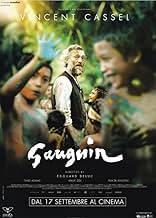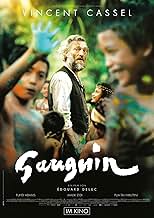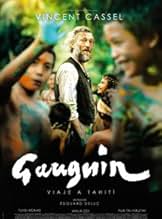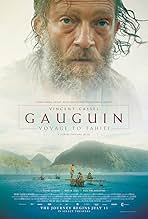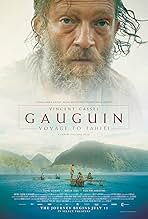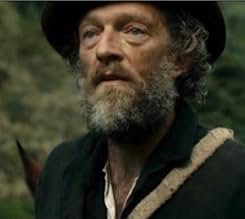IMDb RATING
6.0/10
2.6K
YOUR RATING
Focused on French painter Paul Gauguin's affair with a younger lady in Tahiti.Focused on French painter Paul Gauguin's affair with a younger lady in Tahiti.Focused on French painter Paul Gauguin's affair with a younger lady in Tahiti.
Teiva Monoi
- Onati
- (as Teiva Manoi)
Featured reviews
This film fails in every possible way. Even the cinematography manages to flatten the lushness of Tahiti. But the story line is worse.
One has to wonder how and why it is near impossible for modern people to reconcile that Gauguin can be both a despicable pedophile and a great artist? I guess this is the fruit of ever decreasing interest in the classics, where literature for 3,000 years did not have the difficulty we have today in portraying real or archetypical legendary persons as both great personages and contemptible.
Consider that the entire film fails to mention, even once, this "wife" was 13 years old. That his relationship with her, and the natives, is a refection of his own selfish and predatory individual colonialism. Even his abandonment of his wife and children in France, attested to as abandonment in the sourced biographies, is inverted into them not wanting to come with him.
One has to wonder how and why it is near impossible for modern people to reconcile that Gauguin can be both a despicable pedophile and a great artist? I guess this is the fruit of ever decreasing interest in the classics, where literature for 3,000 years did not have the difficulty we have today in portraying real or archetypical legendary persons as both great personages and contemptible.
Consider that the entire film fails to mention, even once, this "wife" was 13 years old. That his relationship with her, and the natives, is a refection of his own selfish and predatory individual colonialism. Even his abandonment of his wife and children in France, attested to as abandonment in the sourced biographies, is inverted into them not wanting to come with him.
Paul Gauguin has had enough of married life, of France and of misery. In the hope of a healthier and more authentic life, the painter moves to Polynesia. An opportunity for him to develop his style and become an artist with an inimitable touch. There, he also falls in love with the beautiful Tehura. The earthly paradise seems within reach...
On the plus side, a very decent reconstruction of the period, beautiful views of Tahiti and Vincent Cassel's rough but intense interpretation. On the other hand, the watering down of the subject is pretty hard to swallow. The girls (not the girl) with whom Gauguin slept were under the minimum age allowed by the law (which is not the case of the pretty actress Tuhei Adams, eighteen at the the time of filming); as for the disease that struck the artist, it was syphilis, not diabetes. It is not by embellishing things that one captures the truth of a human being.
On the plus side, a very decent reconstruction of the period, beautiful views of Tahiti and Vincent Cassel's rough but intense interpretation. On the other hand, the watering down of the subject is pretty hard to swallow. The girls (not the girl) with whom Gauguin slept were under the minimum age allowed by the law (which is not the case of the pretty actress Tuhei Adams, eighteen at the the time of filming); as for the disease that struck the artist, it was syphilis, not diabetes. It is not by embellishing things that one captures the truth of a human being.
Some good moments in this story of Paul Gauguin and his Tahitian period, emphasizing his relationship with Tehura, but mostly I found the film overly
self-indulgent, and narcissistic on the part of the film creators. I am a bit critical on the subject since Gauguin is my favorite Impressionist, more brilliant in my mind than Vincent. If it had been tighter, with less stream of consciousness and more emphasis on the narrative it would have been more effective. Paul Gauguin has been played by George Sanders (as "Strickland" in Maugham's The Moon and Sixpence) Anthony Quinn, David Carradine, and now Vincent Cassel. All good in their way, each capturing elements of the artist's personality. Surprisingly, of all the actors to play Gauguin David Carradine gives the best performance. Find it if you can in another so-so try at capturing this story, Gauguin the Savage.
Gauguin: Voyage to Tahiti
Gauguin: Voyage to Tahiti is aptly titled.
It's a pity the pace slowed.
Gauguin: Voyage to Tahiti is not a particularly bold film. Nevertheless, it is a film about a very bold person who escapes his bohemian life and introduces a bit of bohemia in the extremely relaxed nation of Tahiti.
I am unsure about the true nature Gauguin. The first part of the film seeks to present him as a man that was abandoned by his wife and family before their planned voyage to Tahiti. In return, he abandons them and lives a life of mild debauchery in a hut by the beach in Tahiti. I presumed the film was a little easy on Gauguin here; he seems to hit the ground running when he arrives and soon forgets his rather laborious family.
The film then obeys a common narrative of a man dealing with a midlife crisis by throwing himself into an affair with young girl - Tehura (a tribal Tahitian offering).
While the script may disappoint; the casting, performances and cinematography are all superb.
Gauguin might be selfish and possessive, but he certainly has conviction. This is certainly something Vincent brought to the screen superbly.
This film touches on a few similar themes to Jane Campions excellent film 'The Piano'. You could almost consider this film to be The Piano through a male lens.
It's a pity the pace of the film slowed. I couldn't help but feel that there is a better film that could have been made here. Perhaps more of his history in Paris would have created a better juxtaposition on what Gaugin left?
However, Gauguin threw himself into a new life and a new art. This above anything else is the most enticing thing about the film. It may inspire.
Gauguin: Voyage to Tahiti is aptly titled.
It's a pity the pace slowed.
Gauguin: Voyage to Tahiti is not a particularly bold film. Nevertheless, it is a film about a very bold person who escapes his bohemian life and introduces a bit of bohemia in the extremely relaxed nation of Tahiti.
I am unsure about the true nature Gauguin. The first part of the film seeks to present him as a man that was abandoned by his wife and family before their planned voyage to Tahiti. In return, he abandons them and lives a life of mild debauchery in a hut by the beach in Tahiti. I presumed the film was a little easy on Gauguin here; he seems to hit the ground running when he arrives and soon forgets his rather laborious family.
The film then obeys a common narrative of a man dealing with a midlife crisis by throwing himself into an affair with young girl - Tehura (a tribal Tahitian offering).
While the script may disappoint; the casting, performances and cinematography are all superb.
Gauguin might be selfish and possessive, but he certainly has conviction. This is certainly something Vincent brought to the screen superbly.
This film touches on a few similar themes to Jane Campions excellent film 'The Piano'. You could almost consider this film to be The Piano through a male lens.
It's a pity the pace of the film slowed. I couldn't help but feel that there is a better film that could have been made here. Perhaps more of his history in Paris would have created a better juxtaposition on what Gaugin left?
However, Gauguin threw himself into a new life and a new art. This above anything else is the most enticing thing about the film. It may inspire.
Just gorgeous, well acted, beautifully and invisibly directed, though some seem to miss the subtle way the cinematography flattens the spaces and abstract the shapes like Gauguin's best artwork does. Cassel is mesmerizing and looks uncannily like Gauguin's self portraits. His portrayal can make us understand the he had no choice but to paint, and all costs.
The simple loving relationship between Paul and Tehura is worn down and corrupted in the same way the People of Polynesia were by sickness and greed introduced by the colonizers. The innocent playful fun, the jealousy, suspicion and pain... this film tells a story that shows there is no running away from the human condition.
The simple loving relationship between Paul and Tehura is worn down and corrupted in the same way the People of Polynesia were by sickness and greed introduced by the colonizers. The innocent playful fun, the jealousy, suspicion and pain... this film tells a story that shows there is no running away from the human condition.
Did you know
- TriviaWhen Paul Gauguin met Teha'amana (also called Tehura), she was 13 and he was 48. They had a daughter that lived only few days a year later.
- ConnectionsFeatured in Stupefying!: La folie Gauguin (2017)
- How long is Gauguin: Voyage to Tahiti?Powered by Alexa
Details
- Release date
- Country of origin
- Official site
- Languages
- Also known as
- Gauguin: Viaje a Tahití
- Filming locations
- Tahiti, French Polynesia(place where Gauguin emigrates)
- Production companies
- See more company credits at IMDbPro
Box office
- Gross US & Canada
- $200,140
- Opening weekend US & Canada
- $35,994
- Jul 15, 2018
- Gross worldwide
- $3,389,322
- Runtime
- 1h 42m(102 min)
- Color
- Sound mix
- Aspect ratio
- 2.35 : 1
Contribute to this page
Suggest an edit or add missing content



